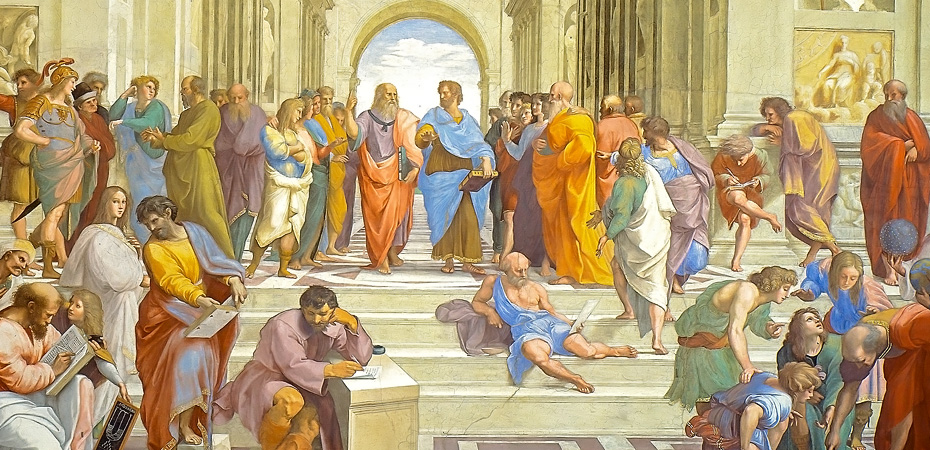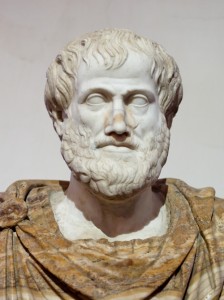A First Year Philosophy Essay on Friendship in the Understanding of Aristotle
Our fascination with friendship and its recurrence as a theme in our philosophy, literature and culture since antediluvian times is indicative of its closeness to the core of the human experience. Yet, when faced with the task of describing it, our conceptual nets never seem quite able to catch it. The age old proverb attributed to Aesop, which serves as this paper’s title, tells us something of the perennial desire for friendship that lies at the heart of man and his acknowledgment of it as a profound necessity. In Books VIII and IX of his work Nicomachean Ethics, Aristotle takes up the struggle to illuminate one of humanity’s greatest leitmotifs, offering a comprehensive explanation of this phenomenon of human interaction. Aristotle would have friendship defined as two persons engaged knowingly and willingly in a reciprocal relationship of good will, either for utility, pleasure or out of goodness and virtue. Aristotle explores how the concept of friendship is imperative to a life of virtue and to the happiness of a man. Most of Aristotle’s analysis of friendship, especially his distinction between kinds of friendship as well as their qualities, rings true to my own experience, while some of what he says meets my experience with some dissonance. Against Aristotle, I would argue that we need more than good friends in the exercise of virtue, and more than human friendship for complete happiness.
I would argue that we need more than good friends in the exercise of virtue, and more than human friendship for complete happiness.
Aristotle begins his study of friendship by defining it as willed, mutually reciprocal and known. He notes that friendship consists of good dispositions, the “wishing [them] the good for [their] own sake”.1 Aristotle notes that this willing of the good of the other cannot be only present in one party, but must consist of both friends willing the good of the other equally, for it “is friendship only when it is reciprocated”. 2 The inanimate object cannot reciprocate good disposition, and so cannot be called a friend. Only persons can be friends. Both parties may will the good of the other, but without knowledge of this, we cannot have friendship. It follows in Aristotles thought then, that it is essential that both parties know the willed good of the other for them. Aristotle mentions that goodwill (ευνοια) can be shown by any person to “one [who] does not know, and without their knowledge”, but that this cannot be called friendship. In Aristotle’s definition of friendship, good will must abound in a chosen,
reciprocal and known manner.
In his elucidation of the expansive concept of friendship (φιλία), Aristotle extricates three distinct kinds of friendship; those based on utility, pleasure and goodness. Persons engaged in a friendship of utility love each other “to the extent that they are useful to each other”.3 This relationship is based on a mutual exchange of usefulness, for example (though crude) between a store owner and a customer, who both need each other for necessary goods and for good business for their store respectively.
Similarly, the love shared within a friendship of pleasure is determined by the amount of pleasure that each person derives from the other, mutually exchanging any sort or number of pleasures; good or funny conversation, sensual excitement, someone to drink with or even the paying of true or false compliments. The friendship of goodness though, stands starkly apart from these initial kinds, being marked by individual recognition of the other as a person of virtue, facilitated in its growth by time spent together in joint engagement in virtuous activities that assist the growth of virtue in them both.4 This is the deeper notion of friendship, people who know, understand, love and push each other toward the greater course of action.
Great contrast lies between the friendships of utility and pleasure and the friendship of goodness. At the heart of this disparity are the foundational attitudes that underlie each kind of association. The former are evidently more defective classes than the latter, and it would seem that Aristotle himself only designates these human interactions with the term ‘friend’ for linguistic ease. In friendships of advantage and pleasure one is, in a manner of speaking, much less a friend to the person offering these goods than to the goods themselves. This plainly surfaces in the hallmarks of these kinds of relationships, which include a lack of trust, frequent “complaints and recriminations” as well as great ease and lack of regard with which these relationships both build and fall.5 In friendships of goodness, we contrarily find a relationship “where there are no complaints”, flowing mellifluously from a desiring of the good of the other precisely for the sake of the other (though this othercenteredness is never presented by the Philosopher as thoughtless self-forgetfulness, but including a balanced self-love). 6 This relationship then is usually longer lasting, with much more time and effort invested into it and with great trust between the two parties.
Aristotle presents friendship as imperative to the happiness of man and his exercise of virtue. He argues that because friends are considered the greatest of external goods, and that men are by nature social beings, “naturally constituted to live in company”, then a solitary life is deemed unfit for the happy man and friendship must therefore be essential to a man’s happiness.7 He continues to argue that a virtuous man would find joy in being among other virtuous people, and that which brings joy to the virtuous man is in itself virtuous. If friendship with other virtuous persons brings joy to the virtuous man, then friendship must be necessary for happiness. He notes that friendship of goodness provides a platform for good living, as the virtuous man must be virtuous to and with someone else.
The friendship shared by two good men will make them greater, as they will encourage each other to greater virtue, “keeping [each other] from mistakes” by the virtuous activities they do with each other and by correcting one another.8 Aristotle continues his study of friendship by appending his general overview of the concept with further salient details. On the quality of friendships, Aristotle notes that a perfect friendship of goodness is established when each party has the same level of virtue. Any distance between the persons in morality and virtue will only serve to make the friendship less perfect. On number, Aristotle explains that one should have “any number of friends… between certain limits”; that one will have a larger number of friends of pleasure and utility, but not so large a number that it becomes tiresome or bothersome, as each favour of pleasure or usefulness must needs be repaid. He notes also that one may only have a few good friends, though some people are incapable of any.9 This is because it takes two virtuous men, and much time to build such a friendship and because there is a limit to how many people one can live nobly with. Another point of note is that there are types of friendships that possess an inequality of power, such as between a mother and child, or king and subject. These friendships are different as there are different roles and expectations to do with gift and reception.
Aristotle also highlights that it is better to give than receive, employing his example of the benefactor and beneficiary; the benefactor tends to love the beneficiary and receives great joy from supporting him, while the beneficiary tends to love the benefit more than the benefactor, and while the benefit is useful, he does not receive the same joy.10 These are only some of the countless further insights that Aristotle relates about friendship.
Most of Aristotle’s analysis of friendship rings true to my personal experience, especially his distinctions between the three classes of friendship, as well as some of their qualities and number. I have long realised, without the succinct language or clarity of conceptual structure that Aristotle offers, that one can only have few good friends at a time. In my own life, I have only ever had one, two or three deep friendships of goodness at a time, and their durations are quite elongated.
Friendships of goodness have also all tended encourage me to be a better person, and have been relationships where I also have assisted the growth of virtue in another. As Aristotle explains, I have experienced that I have a fluctuating, base of friends of utility and pleasure. Unlike my good friendships which are fewer and further between, my friends of utility and pleasure are greater in number, and involve persons with whom I constantly move in and out of friendship. My experience of this movement matches Aristotle’s experience again; if a good friend is lost, I am quite affected emotionally and for some time. Friends of pleasure and utility however, can move in and out of my friendship while they and I remain mutually emotionally unaffected. The main conceptual framework constructed by Aristotle is mostly in accordance with my experience.
Some discordance arises between my experience and Aristotle’s presentation of friendship as necessary to virtue. In his explanation of the benefit of friendship for the augmentation of virtue, Aristotle fails to reveal how an absence of friends would restrict the amount or kind of virtuous activities in which we can take part. While good friends may assist in some way in man’s growth in virtue, I see in my own experience that encounters with complete strangers provide me with even more moments of growth in virtue than times with my close friends. For example, I have been lucky enough to have had many involvements from a young age with care for the hospitalised, giving company to the elderly and demented in nursing homes and schools, feeding and assisting the poor or donating to charity (in which all cases involve contact with complete strangers, often people incapable of friendship by Aristotle’s standards). I have found that these experiences, which are effectively moments of friendlessness, have greatly increased virtue in me, and have only augmented in me a habitual disposition to do the good. There is barley any struggle, and in many cases no virtue, in caring for, visiting, feeding or donating money to a friend, as this brings great pleasure, comes with a sense of duty and an expectation that when I am in need this friend will treat me similarly. Encounters that demand virtuous responses with persons who are unknown to me truly test my ability to act virtuously, as in these cases there is no foreseen external benefit for me. My experience leads me to believe that the private circle of my close friends and family is not a sufficient floor for the practice of and growth in virtue.
From my personal experience, I would disagree with Aristotle in his argument that human friendship is necessary for the happiness of man, but align myself with what he argues against, that “the supremely happy, who are self-sufficient, are in no need of friends”. 11 While I believe that the truth of Aristotle’s opinion stands for many cases, there are several cases in which my own experience has indicated that people may be extremely fulfilled and virtuous without human friendship. I have encountered hermits, or anchorites who live solitarily, yet confess to be extremely happy with their life. While it is difficult to properly evaluate the inner thoughts of another, during my encounter with these people they seemed very peaceful and joyful, and their external behaviour or demeanour indicated nothing contrary to their personal confession of happiness. Aristotle himself describes friendship as the highest of external goods, but my own experience teaches me that only a detachment or freedom from external goods brings about true and lasting happiness.
Books VIII and IX of Nicomachean Ethics, provide one of the most comprehensive analyses of friendship in the history of western thought, still capturing the minds of contemporary audiences and still at the base of our cultural understanding of this phenomenon. In this work, Aristotle defines friendship as two persons engaged in a known and willed and reciprocal relationship of good will, either for its usefulness, pleasure or out of goodness. Aristotle fills out the idea of friendship by exploring its necessity to a man’s life of virtue and to his happiness, as well as analysing a myriad of further important features. For the most part, my experience agrees with Aristotle’s thorough analysis of friendship especially in his definition and classification of the concept. However, some of his ideas meet my experience with dissonance, particularly his suggestion that good friends are imperative to a man’s growth and exercise of virtue and for his complete happiness.
By Jonathan Vala
1 Aristotle, Nicomachean Ethics (Penguin Classics: London 1955 [rev. 2004]) Book 8, Part 2, 203. For the
remainder of this essay, I will quote page number from this edition, distributed by the lecturer.
2 Aristotle, Nicomachean Ethics, 203
3 Aristotle, Nicomachean Ethics, 204
4 Aristotle, Nicomachean Ethics, 305
5 Aristotle, Nicomachean Ethics, 223
6 Aristotle, Nicomachean Ethics, 225
7 Aristotle, Nicomachean Ethics, 246
8 Aristotle, Nicomachean Ethics, 200
9 Aristotle, Nicomachean Ethics, 250
10 Aristotle, Nicomachean Ethics, 241
11 Aristotle, Nicomachean Ethics, 246



